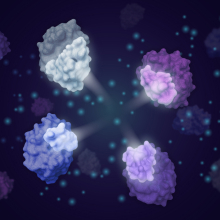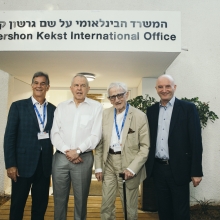The bacteria in cancer
Different tumors have different bacteria. What does it mean for treatment?
Briefs

Cancer cells are comfy havens for bacteria, and many cancer types—like brain, breast, or bone cancers—have their own unique populations of bacteria residing inside of tumor cells. This is the finding of a groundbreaking study by Dr. Ravid Strassman and his team at the Weizmann Institute of Science, which was featured on the cover of a recent issue of the prestigious journal Science.
The research suggests that different cancer types harbor different bacteria and that characterizing the relationship between a cancer cell and its bacteria may help predict the potential effectiveness of treatments.
Dr. Straussman, a member of the Department of Molecular Cell Biology, conducted the study with his post-graduate students Dr. Deborah Nejman and Dr. Ilana Livyatan, and with Dr. Garold Fuks of the Physics of Complex Systems Department. The work was also led by Dr. Noam Shental of the Open University of Israel and other collaborators.
Early insight from pancreatic cancer
Several years ago, Dr. Straussman and his team discovered bacteria lurking within human pancreas tumor cells. These bacteria were shown to “digest” and inactivate chemotherapy drugs, thereby protecting cancer cells. In the new study, Dr. Straussman and his colleagues identified specific bacterial populations in brain, bone and breast, lung, ovary, pancreas, colorectal and melanoma tumors.
Interestingly, breast cancers were shown to have the largest number and diversity of bacteria among all the cancer types. The team demonstrated that some of those bacteria were preferentially found in the tumor tissue rather than in the normal tissue surrounding it—something that may eventually help target tumors in a highly specific manner.
The team reported that bacteria can be found not only in cancer cells, but also in immune cells that reside inside tumors—a discovery that has implications for cancer immunotherapy.
The Science study also demonstrated how metabolites overproduced by or stored within specific tumor types may affect the makeup of the tumor microbiome. Comparing bacteria found in lung tumors from smokers with those from patients who never smoked, the researchers found that those bacteria from smokers’ lung cancer cells had many more genes for metabolizing nicotine, toluene, phenol and other chemicals found in cigarette smoke.
By shedding light on how the balance of bacterial populations in cancerous tumors influence the dynamics of tumor ecology, These findings may lead to novel approaches to treating many different kinds of cancer.
Dr. Ravid Straussman's research is supported by the Roel C. Buck Career Development Chair; the Moross Integrated Cancer Center; the Maurice and Vivienne Wohl Biology Endowment; the Fabricant-Morse Families Research Fund for Humanity; the Chantal D’adesky-Scheinberg Research Fund; the Rising Tide Foundation; the Jacki and Bruce Barron Cancer Research Scholars’ Program, a partnership of the ICRF and City of Hope, as supported by The Harvey L. Miller Family Foundation; the Israel Science Foundation; and the European Research Council.

Dr. Ravid Straussman's study, featured on the cover of Science

Prof. Ravid Straussman








